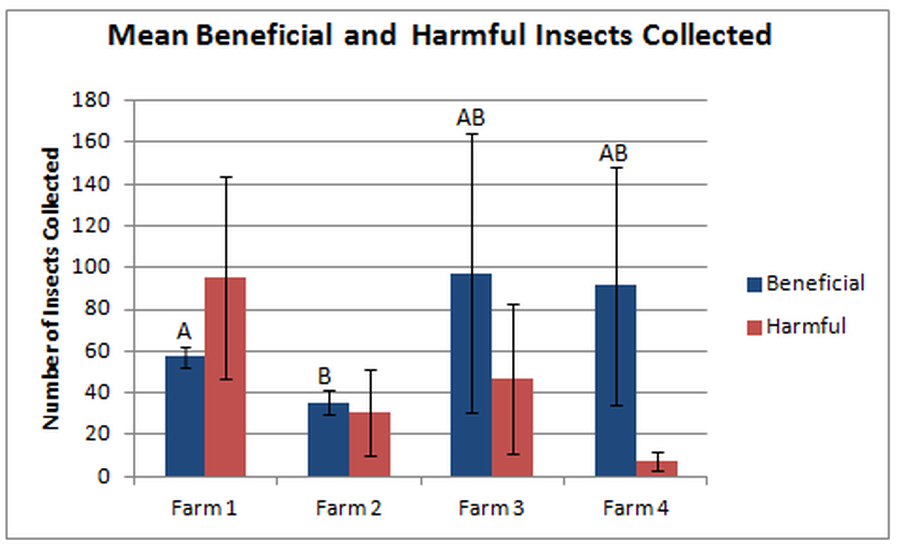LEAVING OUR FIELDS ALONE SO NATURE CAN GET BACK INTO BALANCE COULD BE THE BEST APPROACH ACCORDING TO NEW RESEARCH THAT MEASURES PRESENCE OF BENEFICIAL VS HARMFUL INSECTS.
Farm #4 had the least amount of intervention, more beneficial insects, the least amount of harmful insects, and the highest diversity of beneficial insects with the least diversity of bad ones. In others words, the best outcome you could ask for since you have the least amount of bad insects, and the highest amount of good ones to take care of the job for you. Who needs pesticides when you have this beneficial insect army to get rid of the pests for you! Doesn't it make you ask, "WHAT THE HECK ARE WE DOING USING ALL OF THESE PESTICIDES THAT ARE POISONING US AND THE ENVIRONMENT?"
Farm Sites and Insect Controls
Farm number one (F1), located in Leominster, Massachusetts primarily uses three types of pesticides. F1 uses Chlorantraniliprole (DuPont Coragen Rynazpyr), Lambda-cyhalothrin (Warrior with Zeon Technology Syngenta12, and Imidacloprid (Provado1.6 Bayer) ((IMIDACLOPRID.; 2010. npic.orst.edu/factsheets/imidagen.pdf.)). F1 grows kale, cabbage, collard greens, watermelon, lettuce, apples,peaches tomatoes, eggplant, and corn. Traps were set near kale, cabbage, collard greens and tomatoes).
The insect controls used by farm number two (F2), located in Sterling, Massachusetts, are Insecticidal Soap (Potassium Salts by Bonide ((Bonide Insecticidal SoapMulti-Purpose Insect Control.; 2012. http://www.bonide.com/lbonide/msds/msds651.pdf.)), Azadirachtin (neem oil, Dyna-Gro), and Bacillus thuringiensis (Bt Spray Monterey Garden Insecticide), and corrugated cardboard strips. F2 grows asparagus, kale, cabbage, collard greens, strawberries, lettuce, apples, and tomatoes. Traps were set near kale, cabbage, collard greens, and tomatoes.
The insect controls used by farm number three (F3) in Lincoln, Massachusettsare Spinosad (Naturalyte Insect Control, Enrust) and Remay cloth. F3 grows asparagus, kale, cabbage, collard greens, strawberries, lettuce, tomatoes, and eggplant. Traps were set near asparagus, kale, cabbage, collard greens, and tomatoes.
Farm number four (F4), located inLincoln Massachusetts uses Bacillus thuringiensis (Dipel DF Dry Flowable), Copper Ammonium Complex (Liqui-Cop Copper Fungicidal Spray) 13, and Spinosad (Naturalyte Insect Control, Enrust) to control pests. F4 grows asparagus, kale, cabbage, collard greens, strawberries, lettuce, tomatoes, and eggplant. Traps were set near kale, cabbage, collard greens, and tomatoes. All farms primarily targeted Aphididae, and Pieridae.
Finding sustainable methods to control pest insects that affect crop yield is a pressing, worldwide concern for agriculture. In recent decades, there has been interest in developing less toxic chemicalpesticides, and more sparse regimens for application of these pesticides to avoid also killing beneficial insects during pesticide applications. For this study, insects were collected from four farms in Central Massachusetts (Middlesex and Worcester Counties) to compare the population levels of beneficial and harmful insects at commercial farms using organic vs.chemical pest control methods. Three of the farms used organic insect controls and one of the farms used non – organic chemical insect controls. It was predicted that farms using only chemical pesticides would have lower numbers of both beneficial and harmful insects compared to farms that use organic pesticides. The total number of insects trapped at the four different farms employing different insect control strategies (non – organic chemicals vs. organic ) did not have a statistically significant difference. However, there were fewer beneficial predatory beetles (Carabidae: Coleoptera) found at a farm (site the farm with fewer beetles) using non - organic chemical pest controls (Chlorantraniliprole, Lambda-cyhalothrin, and Imidacloprid) compared to another farm using only one biopesticide , (Spinosad). Our results suggest chemical insect controls have unintended consequences on agroecosystems and merit further study.
Farm Sites and Insect Controls
Farm number one (F1), located in Leominster, Massachusetts primarily uses three types of pesticides. F1 uses Chlorantraniliprole (DuPont Coragen Rynazpyr), Lambda-cyhalothrin (Warrior with Zeon Technology Syngenta12, and Imidacloprid (Provado1.6 Bayer) ((IMIDACLOPRID.; 2010. npic.orst.edu/factsheets/imidagen.pdf.)). F1 grows kale, cabbage, collard greens, watermelon, lettuce, apples,
The insect controls used by farm number two (F2), located in Sterling, Massachusetts, are Insecticidal Soap (Potassium Salts by Bonide ((Bonide Insecticidal Soap
The insect controls used by farm number three (F3) in Lincoln, Massachusetts
Farm number four (F4), located in
Finding sustainable methods to control pest insects that affect crop yield is a pressing, worldwide concern for agriculture. In recent decades, there has been interest in developing less toxic chemicalpesticides, and more sparse regimens for application of these pesticides to avoid also killing beneficial insects during pesticide applications. For this study, insects were collected from four farms in Central Massachusetts (Middlesex and Worcester Counties) to compare the population levels of beneficial and harmful insects at commercial farms using organic vs.
This was lifted from some reproduction of research at the Rodale Institute. I consider the Rodale Institute the most reuputable source for information on farming, GMOs and their relationships to climate change. My personal work at The Learning Garden has involved 17 years of not spraying ANY insecticide and very little physical controls of insects.

No comments:
Post a Comment